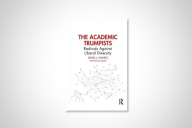You have /5 articles left.
Sign up for a free account or log in.
When faculty members and alumni are as attached to their program as they are to their university, institutional politics get personal.
That’s a lesson Cornell University has been learning over the past month, ever since it announced in mid-December its proposal to create a College of Business. If approved by the Board of Trustees later this week, the proposal will merge the School of Hotel Administration, the Charles H. Dyson School of Applied Economics and Management, and the Samuel Curtis Johnson Graduate School of Management.
Since the announcement, concerned faculty members and alumni have pushed for the administration to take a step back. They worry about the implications of the merger, but at the heart of the criticism is concern with how the decision was made: alumni are loyal to their individual schools and don’t feel like they’re being listened to. And faculty members, who assert that these kinds of decisions are often made through faculty channels, believe they should have been a part of the decision-making process.
“We were simply told that this could happen and then the faculty would be involved later,” said Risa Lieberwitz, professor of labor and employment law and a member of the University Faculty Committee, the executive committee of the Faculty Senate.
Two days after Cornell first announced the proposal, Lieberwitz introduced a Faculty Senate resolution. One sentence long, the resolution requested that the Board of Trustees table the proposal. It passed unanimously.
“The bylaws of the university clearly recognize that faculty governance processes here are essential for considering matters of educational policy,” Lieberwitz said. “The senate was unified in the view that the university administration had completely bypassed and ignored the faculty governance process.”
For faculty members like Lieberwitz, the problem with the merger involves both process and substance: the Faculty Senate should have been informed earlier -- and if it had been, its members would have been able to consider the concerns raised by the proposal.
And then there’s the fact that Elizabeth Garrett, Cornell’s president, is new; she took over in July, less than six months before the proposal was announced. Faculty members are concerned about the future of shared governance under the new administration.
“If they had consulted with the faculty first, the likelihood is that nothing would have happened,” said Ronald Ehrenberg, a Cornell professor of industrial and labor relations and economics and an expert on higher education governance.
For many years, there has been discussion about somehow combining the three programs, Ehrenberg said -- but nothing has ever come from those discussions until now.
“If you’re really trying to jump-start the situation, maybe this is the right way to do it,” he added. “We have a new president and a new provost and I want them very much to succeed. On the other hand, the Faculty Senate is very upset by the action.”
The university declined to comment publicly until the Board of Trustees meets later this week, said John Carberry, a university spokesman. But Garrett and other administrators have addressed alumni and faculty concerns in messages sent directly to the interested groups.
In an FAQ, the university assured faculty members that they will have plenty of input in the planning process. It also addressed other issues alumni have expressed concern about, including the fact that donations can still be separated by school, and each school will continue to use unique admissions processes.
The university also sent a message to the Cornell Hotel Society, the alumni association of the School of Hotel Administration, which linked both to the FAQ and to a statement from three alumni leaders in support of the reorganization. The statement argued that the reorganization will help the Hotel School benefit from the other business schools, and ended with a quote from General Eric Shinseki, retired: "If you don't like change, you're going to like irrelevance even less."
But for many alumni critics -- especially those from the Hotel School, who are particularly loyal to their alma mater -- the proposal seems like an affront to an institution they care about and a community they feel a strong connection to.
“I didn’t hear the announcement from Cornell. I actually heard it from a current student,” said Elaine Liang, who graduated from the School of Hotel Administration in 2014. “We don’t know what’s going to happen to the school, to the courses, to the faculty.”
After the announcement, Liang helped put together a petition asking the Board of Trustees to vote against the merger. According to the opponents’ Facebook group, called “Keep Cornell Hotel School Independent,” the petition had approximately 500 signatures as of Saturday.
“The hotel school’s really small and we all have this sense of belonging,” Liang said. “We dominate the industry, so being merged into this College of Business just doesn’t make any sense to us.”
In addition to the petition, some alumni started mass email chains to voice their concerns about the merger.
“The world does not need more investment bankers,” Federico Castellucci III, who graduated from the School of Hotel Management in 2007, said in the email chain. “The world needs more creative thinkers, entrepreneurs, and dare I say a little more hospitality.”
Alumni also suggest that the change could impair donations. “When it comes time for me to start distributing my wealth to organizations and charities, will the Cornell College of Business that I never attended be at the top of my list?” Castellucci added. “I don't think so.”
For universities like Cornell, making a structural change to a community with a strong sense of identity is a unique challenge. Some alumni feel that a merger would change the character of their alma mater, Liang said. If someone from the new College of Business reached out to her, she said she would try to help -- but she would feel more inclined if she were contacted by the School of Hotel Management.
It would be almost as if her alma mater didn’t exist anymore, she said. “Why would you try to help someone that you don’t even know?”








